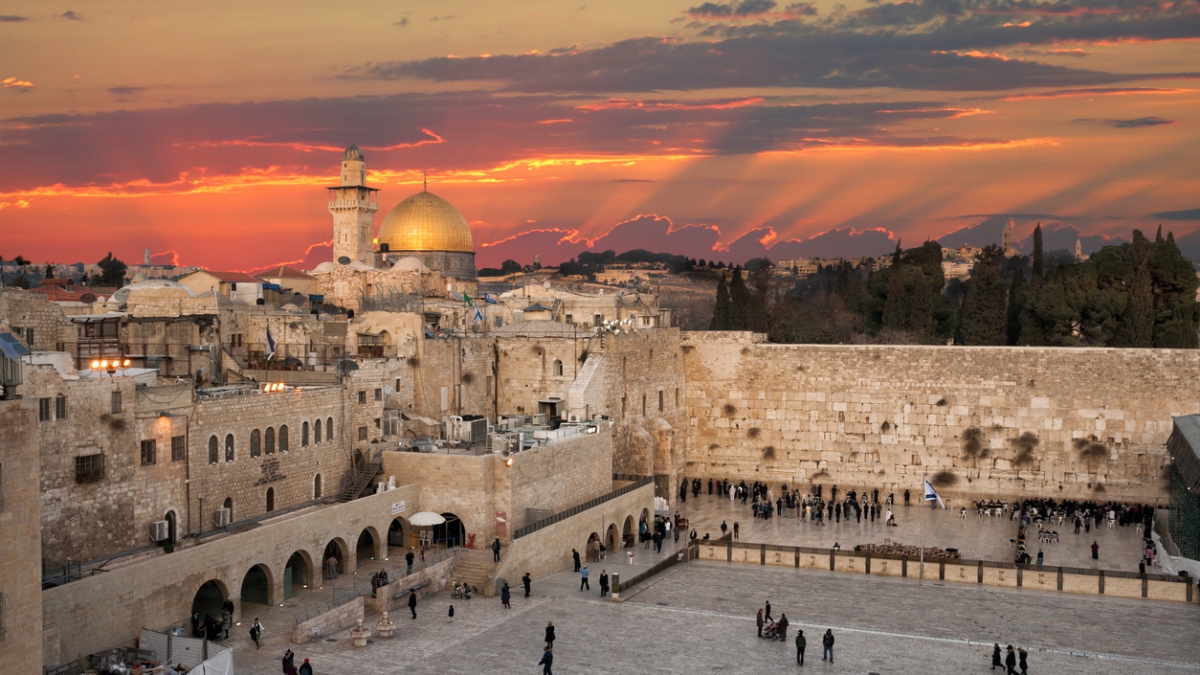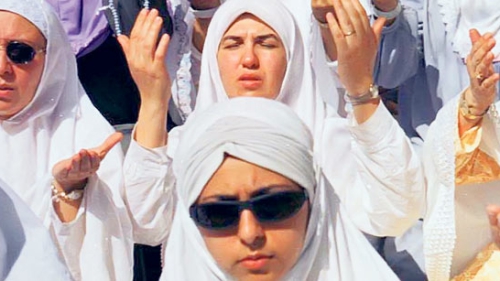Jerusalem Temple And Its Older Brother: The Ka'ba

Now with the excitement of Hajj still in mind, Jews and Muslims should look together at some of the connections between the two holy sites of monotheistic pilgrimage.
The Jerusalem Temple (Beit HaMikdosh) and the Ka'ba, the House of God (Baitullah) in Mecca are the two most well-known sites for monotheistic pilgrimage in the world.
The Islamic Hajj to the Ka’ba in Makka, and the Jewish Hajj to the Temple in Jerusalem, have been alternate swings of a single sacred pendulum connecting earthly humans to one monotheistic Divine source in the heavens.
The Ka’ba was the original site of the Islamic Hajj. Destroyed in the days of Noah, it was later rebuilt by Abraham and his son Ishmael. After several centuries it was desecrated by later generations of idol worshipers.
During the centuries while the Ka’ba was desecrated, Prophet Solomon built a Temple in Jerusalem for Jewish Haj on the site where Abraham bound his son Isaac as an offering to God.
Four centuries later the Temple of Solomon was destroyed in 587 BCE by the Babylonians. Then the Temple was rebuilt with the support of Cyrus the Great, King of Persia, and lasted for almost six centuries. As Philo of Alexandria (c. 20 BCE – c. 50 CE) states; Jewish pilgrims came to Jerusalem from the ends of the earth, and from all the compass points.
But with the destruction of the Second Temple by the Romans in 70 CE, the pilgrimage Hajj aspect of the week-long harvest festival of Hag Sukkot, began a gradual decline in the spiritual consciousness of the Jewish People.
The first time Hag/Hajj is mentioned in the Torah is in that famous scene when Prophets: “Moses and Aaron told Pharaoh; ‘Thus says the LORD God of Israel, Let my people go into the wilderness, that they may hold a feast (Hag) for me.’" [Exodus 5:1]
The verb translators render as "feast" is yakhuggū (יחגו) which is cognate to the Arabic "yuhajjū" (يُحَجّوا) so the verse should be rendered in this context as: "And afterward Moses and Aaron went in and told Pharaoh; ‘Thus saith the LORD God of Israel, Let my people go, that they may hold a Hajj/pilgrimage feast for me in the wilderness.’”
But that one-time Hajj never occurred because Pharaoh refused to free the Jewish People thus incurring Divine wrath.
The normative annual two Jewish Hajj week-long pilgrimages was the liberation celebration of Haj Passover; and especially the gratitude celebration of the harvest festival of Haj Sukkot. The Torah declares:
“Celebrate Hajj Sukkot for seven days after you have harvested the produce of your threshing floor and your winepress. Be joyful at your festival—you, your sons and daughters, your male and female servants, the Levites, the foreigners, the fatherless and the widows who live in your towns…Three times a year all your men must appear before the Lord your God at the place He will choose: at the Hajj of Matzah (Passover), the Hajj of Weeks, and the Hajj of Sukkot. (Deuteronomy 16:13-16)
Hajj Sukkot was so important during the centuries when Solomon's Temple stood that the holy week of Sukkot was often called simply "the Hajj” because of the very large numbers of Jews who came up to the Temple in Jerusalem. Hajj Passover is also celebrated as a weeklong pilgrimage.
The third Hajj of Weeks is similar to Islamic Umrah, the non-mandatory lesser pilgrimage made by Muslims to Mecca, which may be performed at any time of the year. Although they share common rites, Umrah can be performed in less than a few hours; while Hajj is more time-consuming and involves many more rituals.
The third Jewish Hajj of Weeks, like Umrah is much simpler than Hajj Passover and can be performed in less than a few hours; on any one day during the seven weeks following Hajj Passover.
Although Prophet Solomon’s wealth built the Jerusalem Temple, it is his father, Prophet David’s musical songs and chants, that made the services very special. The Psalms/Zabur of David (Qur’an 4:163, 17:55, 21:105) often refer to the Jewish worshiper’s love of the Jerusalem Temple, first as a sacred tent with Sakina in the desert, and later as the courtyards of God’s house on the holy mountain of Zion.
For example, some scholars think that the words of Psalm 15 were inscribed on the doorposts or lintels of the Jerusalem Temple courtyards:
A psalm of David
1 Lord, who may dwell in your sacred tent?
Who may live on your holy mountain?
2 One whose walk is blameless, who does what is righteous,
who speaks truth from their heart;
3 whose tongue utters no slander, who does no wrong to a neighbor,
and casts no slur on others;
4 who despises a vile person, but honors those who fear the Lord;
who keeps an oath even when it hurts, and does not change his or her mind;
5 who lends money to the poor without interest;
and does not accept a bribe against the innocent.
Whoever does these things will never be shaken.
Another example is from Prophet David’s Psalm 27:4-7 with its Sukkah reference to Hajj Sukkot
4 One thing I ask from the Lord, this only do I seek:
that I may dwell in the house of the Lord all the days of my life,
to gaze on the beauty of the Lord and to seek Him in His temple.
5 For in the day of trouble He will keep me safe in His Sukkah ;
He will hide me in the shelter of his sacred tent and place me high upon a rock.
6 Then my head will be exalted above the enemies who surround me;
at his sacred tent I will make offerings with shouts of joy;
I will sing and make music to the Lord.
7 Hear my voice when I call, Lord; be merciful to me and answer me. (27:4-7)
Finally, a selection from one of several hymns not composed by Prophet David (Psalm 84) that mentions the Valley of Baka (Makka) and the spring/well of Zamzam:
By the Sons of Korah. A psalm.
1 How lovely is your dwelling place, Lord Almighty!
2 My soul yearns, even faints, for the courts of the Lord;
my heart and my flesh cry out for the living God.
3 Even the sparrow has found a home, and the swallow a nest for herself, where she may have her young—a place near your altar, Lord Almighty, my King and my God.
4 Blessed are those who dwell in your house; they are always praising you.
5 Blessed are those whose strength is in you, whose hearts are set on pilgrimage.
6 As they pass through the Valley of Baka, they make it a place of springs;
autumn rains also cover it with pools.
7 They go from strength to strength, until each appears before God in Zion.
8 Hear my prayer, Lord God Almighty; listen to me, God of Jacob.
9 Look on our shield, O God; look with favor on your anointed one.
10 Better is one day in your courts than a thousand elsewhere;
I would rather be a gatekeeper in the house of my God than dwell in the tents of the wicked.
11 For the Lord God is a sun and shield; the Lord bestows favor and honor;
no good thing does he withhold from those whose walk is blameless.
12 Lord Almighty, blessed is the one who trusts in you. (84:1-12)
Surely these three psalms from David’s Zabur are in accord with the Qur’an’s charge: “So celebrate with praises the name of your Lord, the Supreme One.” (Quran 59:56)
Allen S. Maller is an ordained Reform Rabbi who retired in 2006 after 39 years as the Rabbi of Temple Akiba in Culver City, California. His web site is: www.rabbimaller.com. Rabbi Maller blogs in the Times of Israel. His book ‘Judaism and Islam as Synergistic Monotheisms: A Reform Rabbi's Reflections on the Profound Connectedness of Islam and Judaism’ (31 articles previously published by Islamic web sites) is for sale ($15) on Amazon.
Topics: Hajj, Interfaith, Jerusalem, Kabah
Views: 5316
Related Suggestions

















